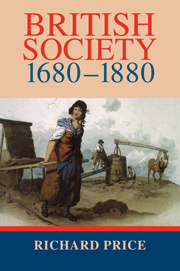Book contents
- Frontmatter
- Contents
- Preface
- Acknowledgments
- Introduction: beginnings, periods and problems
- 1 The economy of manufacture
- 2 A universal merchant to the world: the political economy of commerce and finance
- 3 The ambiguities of free trade
- 4 The reach of the state: taxation
- 5 The age of localism
- 6 The public, the private and the state: civil society 1680–1880
- 7 Exclusion and inclusion: the political consequences of 1688
- 8 Exclusion and inclusion: defending the politics of finality 1832–1885
- 9 The stabilities and instabilities of elite authority: social relations c.1688–c.1880
- Afterword
- Index
Afterword
Published online by Cambridge University Press: 02 December 2009
- Frontmatter
- Contents
- Preface
- Acknowledgments
- Introduction: beginnings, periods and problems
- 1 The economy of manufacture
- 2 A universal merchant to the world: the political economy of commerce and finance
- 3 The ambiguities of free trade
- 4 The reach of the state: taxation
- 5 The age of localism
- 6 The public, the private and the state: civil society 1680–1880
- 7 Exclusion and inclusion: the political consequences of 1688
- 8 Exclusion and inclusion: defending the politics of finality 1832–1885
- 9 The stabilities and instabilities of elite authority: social relations c.1688–c.1880
- Afterword
- Index
Summary
The central argument that has gone before may be easily restated. The two centuries from the late 1700s to the late 1900s formed a distinct period in the history of modern Britain. The historical configurations of this period were provided by the particular balance that obtained between containment and change. This balance was not a tension between the contradictory forces of progress and the forces of tradition, although historians are constantly tempted to view it in this way. The relationship between the influences that compelled change and the restraints that contained those energies was reciprocal and integrated. Naturally, in each domain of historical experience examined here the dynamic interaction between the processes of change and of containment assumed different forms.
For example, the economy of manufacturing was capable of enormous expansion within the methods and systems that had traditionally provided its capacities. Yet, it was constrained by, among other things, the predominance of small-scale organization and the commercial orientation of the political economy. The historical significance of the cotton spinning industry is that it signaled an early example of how the constraints of the manufacturing system could be transcended. Those constraints were not, however, dysfunctional to the relationships between the various economic sectors in this period. Whatever was true in the twentieth century, the political economy of manufacturing does not seem to have sacrificed the interests of one sector to the priorities of another.
The dynamic in the sphere of the state structures was shaped by the forces of localism and by their ability to contain pressure from the center. Indeed, there is little evidence of concerted efforts from the center to disrupt this arrangement.
- Type
- Chapter
- Information
- British Society 1680–1880Dynamism, Containment and Change, pp. 336 - 342Publisher: Cambridge University PressPrint publication year: 1999



